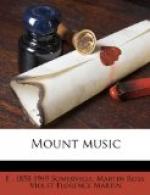Larry snatched his plunging horse from Christian, and started to gallop before he was fairly in the saddle, kicking his right foot into the stirrup as he went, and shouting gratitude to Christian for having held the horse. It had not been easy. Nancy had proved the accuracy of her groom’s statement by again “going up as straight as a ribbon” when the hounds crossed the road, and the bay had not been backward in emulating her efforts. Bill Kirby had had luck; the fox had run left-handed under the wall, and the leading hounds met the Master, with the body of the pack, at the verge of the wood on its farther side. A bank, pitted with rabbit-holes, a space of stony lane with a pole at its farther end, and Nad Wood was a thing of the past.
Outside, a fair stretch of grass presented itself, falling in mild gradients to the banks of the Broadwater, sprinkled with cattle, dotted with groups of trees clustering round white farm houses, from whose chimneys the thin, blue lines of the smoke of morning fires were just beginning to ascend.
But few are able to spare much thought for others during a first burst out of covert, their strictly personal affairs being as sufficient for them as is the day’s share of good and evil for the day; but Larry, looking often over his shoulder as he galloped, did not fail to note, despite his engrossment in his new purchase, the ease and competence that marked Christian’s dealings with the chestnut mare, to whom the twin gifts of imagination and invention had been lavishly granted. It has been ingeniously said that the enemy of the aboriginal horse was a creature of about the size of a dinner-plate, that lay hidden in grass; nothing less than a concealed dinner-service would have sufficed to account for the mysterious alarms that repeatedly swept Nancy from her course; wafting her, like a leaf, sideways from a stream, impelling her to swing, from the summit of a bank, back to the field from which she had wildly sprung; suggesting to her that safety from the besetting dangers could alone be secured by following the bay horse (whom, after the manner of young horses, she had adopted as a father) so closely, and at such a rate of speed, that a live torpedo attached to his tail could hardly have been a less desirable companion.
At a momentary check, an elderly farmer, many of whose horses had owed to Christian their first introduction to a side saddle, spoke to her.
“For God’s sake, Miss Christian,” he said, fervently, “go home with that mare! She’s very peevish! I wouldn’t like to be looking at her! She has that way of jumping stones her nose’d nearly reach the ground before her feet!”
“Never fear that young lady’s able for her!” struck in another farmer, the former owner of Nancy. “How well yourself’d be asking her to be riding nags that couldn’t see the way that little mare’d go! Didn’t I see her go mountains over the stone gap awhile ago? And yourself seen the same, John Kearney!”




